- About Ramapo
- Academics
- Admissions & Aid
- Student Life
- Athletics
- Alumni
- Arts & Community
- Quick Links
- Apply
- Visit
- Give
Courses
Visit the Online Catalog for current information on courses offered in the English and Literary Studies major. To get to the Online Catalog, visit the Web for Students page. From there, go to “Class Schedule.” From there, the system will lead you to this and next semesters’ offerings.
Recurring Courses with Unique Section Descriptions
Current/Upcoming Fall & Spring Semesters: LITR 319 AUTHOR STUDIES & LITR 414 LITERATURE SEMINAR & NEW COURSES
Fall 2018
LITR 414 AMERICAN LITERATURE AND LAW
A senior Literature seminar, this is an interdisciplinary course examining fictional and non-fictional literature on American law. Much of American philosophy and culture are embedded in its literature, and the literature of the law is a particularly rich site for studying American life and its legal culture. The field of literature and law recognizes how essentially stories shape the field of law, how an understanding of the ambiguity inherent in studying literature can assist anyone examining the law, and how such literary acts as character analysis and inference, among others, span the two disciplines. This movement includes law as literature, which we will also examine but which will not be our principal focus.
LITR 295 TOPICS IN POPULAR LITERATURE: Gothic Literature
This iteration of LITR 295 explores eighteenth- and nineteenth-century gothic fiction, one of the earliest—and most derided—forms of popular literature. With an emphasis on the British tradition, but with consideration of American and German examples as well, this course will examine a number of gothic fictions from the first gothic novel, Walpole’s The Castle of Otranto, to Stoker’s Dracula by way of Shelley’s Frankenstein, a novel that just celebrated its bicentennial. This course will also place the early gothic novel in the context of larger eighteenth-century cultural obsessions with all things gothic and discuss the producers, consumers, and businesses that made the early gothic popular. Freud’s seminal essay “The Uncanny” will provide a general lens through which we will view this exciting—and terrifying—body of work.

Fall 2016
LITR 319 AUTHOR STUDIES: Toni Morrison and Virginia Woolf
 In very different cultural contexts, Toni Morrison and Virginia Woolf tell and retell personal and collective stories in such a way that asks readers to explore their own lives in terms of larger stories of compassion and survival. In the telling of stories, Morrison and Woolf rely on memory as central to understanding one’s identity and place in history. In this course, we will closely read their texts and analyze both the differences and similarities that bind together and separate these two great twentieth century writers. We will look at the historical and intellectual currents that have influenced these writers’ works. At the same time, we will examine their narrative strategies, their use of language, and their thematic concerns.
In very different cultural contexts, Toni Morrison and Virginia Woolf tell and retell personal and collective stories in such a way that asks readers to explore their own lives in terms of larger stories of compassion and survival. In the telling of stories, Morrison and Woolf rely on memory as central to understanding one’s identity and place in history. In this course, we will closely read their texts and analyze both the differences and similarities that bind together and separate these two great twentieth century writers. We will look at the historical and intellectual currents that have influenced these writers’ works. At the same time, we will examine their narrative strategies, their use of language, and their thematic concerns.
![]()
LITR 414 Literature Seminar: American Literature and Law
This is an interdisciplinary, literature-based course examining fictional and non-fictional literature on American law. There is an emerging field of literature and law which recognizes how essentially stories shape the field of law, how an understanding of the ambiguity inherent in studying literature can assist anyone examining the law, and how such literary acts as character analysis and inference span the two disciplines. Much of American philosophy and culture are embedded in its literature, and the literature of the law is a particularly rich site for exploring the meaning of American life and its legal culture.
LITR 414 Literature Seminar: The Performance of Everyday Life
 Prior to the twentieth century, most people assumed that “great art” was defined by its ability to transcend the concerns and constraints of popular, everyday life. However, the twentieth century welcomed a number of artists, philosophers and activists who challenged the sacred line separating “art” from “real life.” These vanguard artists and scholars challenged traditional definitions of art by asking: What happens if we apply what we know about literary interpretation to the world outside of the book? If all the world is truly a stage, can we analyze that stage the way we analyze dramatic performances? What props and what settings shape the variety of characters we perform in our daily routines? How are theatrical rituals related to other social rituals, and how are these related to quotidian habits (e.g. ordering food, making jokes, puttering, or walking through the city)? How is the line separating art from everyday life constructed and maintained by institutions such as schools, churches, museums, galleries, and courts? This course will introduce students to an interdisciplinary field known as “everyday life studies,” a growing field that combines the methods and insights of literary studies with those of theatre and performance studies, anthropology, psychoanalysis, political theory, cartography, architecture, the visual arts, and sociology. The main text in the class will be the everyday life and world of the students, but we will also read essays by writers who have blurred the distinction between the “aesthetic” and the “everyday.” Such writers may include Walter Benjamin, Bertol Brecht, Michel de Certeau, Siegfried Kracauer, Sigmund Freud, Roland Barthes, Erving Goffman, Richard Scheckner, Guy Debord, J.L. Austin, Jacques Derrida and Slavoj Žižek.
Prior to the twentieth century, most people assumed that “great art” was defined by its ability to transcend the concerns and constraints of popular, everyday life. However, the twentieth century welcomed a number of artists, philosophers and activists who challenged the sacred line separating “art” from “real life.” These vanguard artists and scholars challenged traditional definitions of art by asking: What happens if we apply what we know about literary interpretation to the world outside of the book? If all the world is truly a stage, can we analyze that stage the way we analyze dramatic performances? What props and what settings shape the variety of characters we perform in our daily routines? How are theatrical rituals related to other social rituals, and how are these related to quotidian habits (e.g. ordering food, making jokes, puttering, or walking through the city)? How is the line separating art from everyday life constructed and maintained by institutions such as schools, churches, museums, galleries, and courts? This course will introduce students to an interdisciplinary field known as “everyday life studies,” a growing field that combines the methods and insights of literary studies with those of theatre and performance studies, anthropology, psychoanalysis, political theory, cartography, architecture, the visual arts, and sociology. The main text in the class will be the everyday life and world of the students, but we will also read essays by writers who have blurred the distinction between the “aesthetic” and the “everyday.” Such writers may include Walter Benjamin, Bertol Brecht, Michel de Certeau, Siegfried Kracauer, Sigmund Freud, Roland Barthes, Erving Goffman, Richard Scheckner, Guy Debord, J.L. Austin, Jacques Derrida and Slavoj Žižek.
- This course can fulfill the capstone OR drama requirement for the English & Literary Studies Major. At the same time, it can fulfill the drama requirement for secondary education English certification.
![]()
Spring 2017
LITR 319 AUTHOR STUDIES: Mark Twain
In this class we will examine the work of one author in detail. Our goal is to understand the work of this author in a 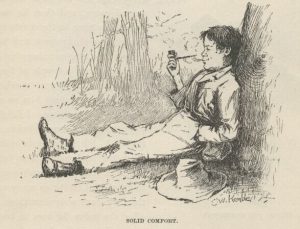 variety of contexts. While we want to be able to appreciate the works for their individual merits, we also want to approach the work in historical and biographical contexts. Through intensive study of one author, we hope to gain insight into his artistic project, and to become “experts” on a major literary figure. The writer whose work we will examine is virtually synonymous with American for much of the world. Mark Twain was one of first American literary celebrities nationwide and abroad. A southerner who went west, and later settled in Connecticut, Twain could represent the nation in a way that few other writers could. He was also perceived abroad as, in Twain’s words “Not an American,” but “the American.” Through a reading of Twain’s fiction and non-fiction, we will grapple with a writer whose savage wit and literary daring still shocks and delights readers almost a century after his death.
variety of contexts. While we want to be able to appreciate the works for their individual merits, we also want to approach the work in historical and biographical contexts. Through intensive study of one author, we hope to gain insight into his artistic project, and to become “experts” on a major literary figure. The writer whose work we will examine is virtually synonymous with American for much of the world. Mark Twain was one of first American literary celebrities nationwide and abroad. A southerner who went west, and later settled in Connecticut, Twain could represent the nation in a way that few other writers could. He was also perceived abroad as, in Twain’s words “Not an American,” but “the American.” Through a reading of Twain’s fiction and non-fiction, we will grapple with a writer whose savage wit and literary daring still shocks and delights readers almost a century after his death.
- This course fulfills either the Author Studies requirement, or the American Literature requirement of the English & Literary Studies Major. It also counts as one of the three 300-level courses English & Literary Studies Majors must take. At the same time, it can fulfill the American Literature requirement for secondary Teacher Education Content Area Requirements (Literature).
LITR 319 AUTHOR STUDIES: Franz Kafka
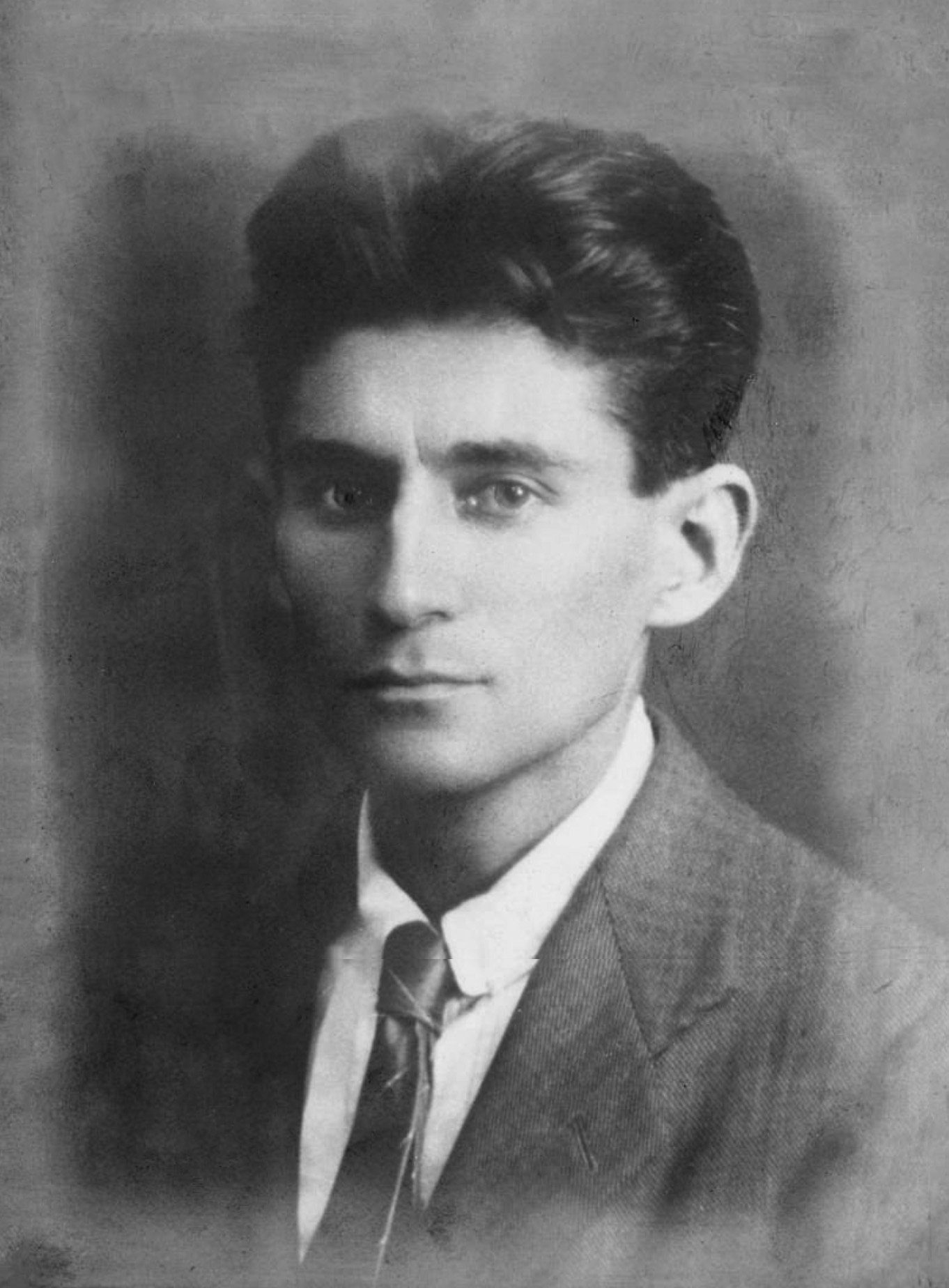 Kafka, a Central European author, is internationally known and of influence, especially in the early 20th century. His novels, prose, and short stories are widely taught and shared, most commonly “The Metamorphosis” and The Trial. Not only does his creative form contribute to the literary world, but his narrative art captivates Central European society, history, and political tension during his lifetime. His thematic elements of isolation, personification, methodology, and allegory create a background for his German heritage and hometown in the Czech Republic, Prague. Required course readings will cover some of the most well-known writings of Franz Kafka as well as writings on Kafka major literary critics have produced.
Kafka, a Central European author, is internationally known and of influence, especially in the early 20th century. His novels, prose, and short stories are widely taught and shared, most commonly “The Metamorphosis” and The Trial. Not only does his creative form contribute to the literary world, but his narrative art captivates Central European society, history, and political tension during his lifetime. His thematic elements of isolation, personification, methodology, and allegory create a background for his German heritage and hometown in the Czech Republic, Prague. Required course readings will cover some of the most well-known writings of Franz Kafka as well as writings on Kafka major literary critics have produced.
- This course fulfills either the Author Studies requirement, or the International Literature requirement of the English & Literary Studies Major. It also counts as one of the three 300-level courses English & Literary Studies Majors must take. At the same time, it can fulfill the International / Multicultural Literature requirement for secondary Teacher Education Content Area Requirements (Literature)
LITR 414 Literature Seminar: Arthurian Literature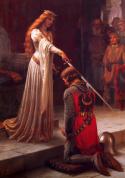
During the semester we will be looking at Arthurian literature. The first half of the course will focus on the origins of the Arthurian legend and its medieval developments; in the second half we will consider retellings of the legend in later centuries. Through a series of linked assignments culminating in a research paper, students will explore how the legend changes as it is taken up by different authors and cultures.
- This course fulfills either the SEMINAR requirement OR the pre-1800 Literature requirement. At the same time, it can fulfill the British Literature requirement for secondary Teacher Education Content Area Requirements (Literature).
LITR 279 The Graphic Narrative
The Graphic Narrative studies the rise and development of what some consider a “new” literary form: the graphic novel 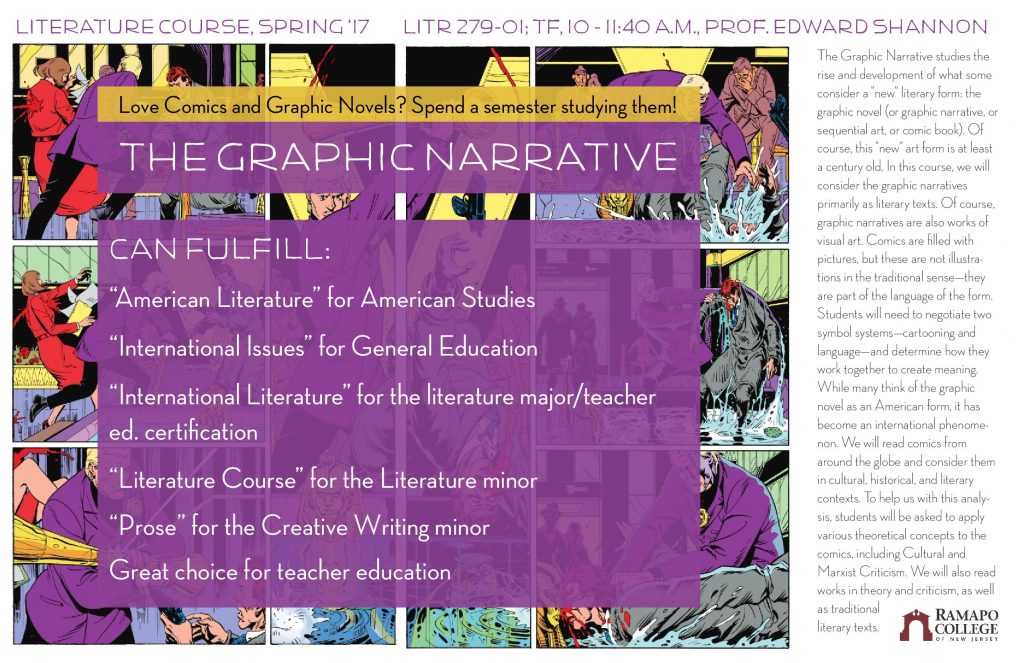 (or graphic narrative, or sequential art, or comic book). Of course, this “new” art form is at least a century old. In this course, we will consider the graphic narratives primarily as literary texts. Of course, graphic narratives are also works of visual art. Comics are filled with pictures, but these are not illustrations in the traditional sense—they are part of the language of the form. Students will need to negotiate two symbol systems—cartooning and language—and determine how they work together to create meaning. While many think of the graphic novel as an American form, it has become an international phenomenon. We will read comics from around the globe and consider them in cultural, historical, and literary contexts. To help us with this analysis, students will be asked to apply various theoretical concepts to the comics, including Cultural and Marxist Criticism. We will also read works in theory and criticism, as well as traditional literary texts.
(or graphic narrative, or sequential art, or comic book). Of course, this “new” art form is at least a century old. In this course, we will consider the graphic narratives primarily as literary texts. Of course, graphic narratives are also works of visual art. Comics are filled with pictures, but these are not illustrations in the traditional sense—they are part of the language of the form. Students will need to negotiate two symbol systems—cartooning and language—and determine how they work together to create meaning. While many think of the graphic novel as an American form, it has become an international phenomenon. We will read comics from around the globe and consider them in cultural, historical, and literary contexts. To help us with this analysis, students will be asked to apply various theoretical concepts to the comics, including Cultural and Marxist Criticism. We will also read works in theory and criticism, as well as traditional literary texts.
Past Semesters' LITR 319 AUTHOR STUDIES & LITR 414 LITERATURE SEMINAR
319-01 AUTHOR STUDIES: WOOLF/MORRISON
Time: 9:45-11:15 am Days: MR
Professor: Lisa Williams (liwillia@ramapo.edu)
Description: In very different cultural contexts, Toni Morrison and Virginia Woolf tell and retell personal and collective stories in such a way that asks readers to explore their own lives in terms of larger stories of compassion and survival. In the telling of stories, Morrison and Woolf rely on memory as central to understanding one’s identity and place in history. In this course, we will closely read their texts and analyze both the differences and similarities that bind together and separate these two great twentieth century writers. We will look at the historical and intellectual currents that have influenced these writers’ works. At the same time, we will examine their narrative strategies, their use of language, and their thematic concerns.
319-02 AUTHOR STUDIES: AUGUST WILSON
Time: 9:45-11:15 am Days: TF
Professor: Donald Fucci (dfucci@ramapo.edu)
Description: The course will study August Wilson’s monumental contribution’s to 20th century American theater. We will focus on the “Pittsburgh Cycle,” Wilson’s 10 play series that charts the African American experience throughout the 20th century, decade by decade. Plays to be examined include “Fences” and “The Piano Lesson” among others.
414-01 SEMINAR: ARTHURIAN LITERATURE
Time: 2:00-3:30 pm Days: MR
Professor: Yvette L Kisor (ykisor@ramapo.edu)
Description: During the semester we will be looking at Arthurian literature. The first half of the course will focus on the origins of the Arthurian legend and its medieval developments; in the second half we will consider retellings of the legend in later centuries. Through a series of linked assignments culminating in a research paper, students will explore how the legend changes as it is taken up by different authors and cultures. LITR 41402 INTERNATIONAL MODERNISM: This course will look at modernism–the artistic period taking place between the two world wars–from an international perspective. We will look closely at both the form and content of literary texts as we analyze how different writers contributed to this movement. The effects of World War I, as well as the discoveries of Freud and Einstein, radically changed how people responded to the world around them. We will examine how artists, particularly writers, reacted to the great upheavals of the early 20th century.
414-02 SEMINAR: INTERNATIONAL MODERNISM
Time: 8:00-9:30 am Days: MR
Professor: Lisa Williams (liwillia@ramapo.edu)
Email Professor Williams if you have any questions regarding the class.
LITR 319-01: AUTHOR STUDIES: MARK TWAIN
Time: 6:00 pm – 9:15 pm /Days: T
Professor: Edward A. Shannon (eshannon@ramapo.edu)
Description: In this class we will examine the work of one author in detail. Our goal is to understand the work of this author in a variety of contexts. While we want to be able to appreciate the works for their individual merits, we also want to approach the work in historical and biographical contexts. Through intensive study of one author, we hope to gain insight into his artistic project, and to become “experts” on a major literary figure.
The writer whose work we will examine is virtually synonymous with American for much of the world. Mark Twain was one of first American literary celebrities nationwide and abroad. A southerner who went west, and later settled in Connecticut, Twain c
ould represent the nation in a way that few other writers could. He was also perceived abroad as, in Twain’s words “Not an American,” but “the American.” Through a reading of Twain’s fiction and non-fiction, we will grapple with a writer whose savage wit and literary daring still shocks and delights readers almost a century after his death.
This course fulfills either the Author Studies requirement, or the American Literature requirement of the English & Literary Studies Major. It also counts as one of the three 300-level courses English & Literary Studies Majors must take. At the same time, it can fulfill the American Literature requirement for secondary Teacher Education Content Area Requirements (Literature).
LITR 414 -01: SEMINAR: Jerseyana: New Jersey Literature and Culture
 Time: 8:00 am – 9:30 am/ Days: MR
Time: 8:00 am – 9:30 am/ Days: MR
Professor: Patricia M. Ard
New Jersey has been called the “most American state,” by former United States Poet Laureate and New Jersey native Robert Pinsky. The state has a long history of attracting and creating artists, including writers. The most densely populated of the fifty states, it packs a rich diversity of topography, including the Jersey Shore and the Pine Barrens, as well as ethnicities, into its small borders. Often the target of jokes from its neighbors Pennsylvania and New York, the Garden State has in the recent several decades gained an appreciative world wide audience for its quirky, proud character. This multi-disciplinary senior seminar will explore the state’s essence through its authors, literature, history and culture, using books, poems, essays, music, TV and film.
This course can fulfill either the Capstone OR American Literature requirement of the English & Literary Studies Major. At the same time, it can fulfill one of the American requirements for secondary education English certification.
FALL 2013: LITR 319 AUTHOR STUDIES & LITR 414 LITERATURE SEMINAR & NEW COURSES
 LITR 319-01: AUTHOR STUDIES: CHAUCER
LITR 319-01: AUTHOR STUDIES: CHAUCER
Time: 11:30 am – 1:00 pm/Days: MR
Professor: Yvette L. Kisor (ykisor@ramapo.edu)
Description: This course focuses on some of the works of Geoffrey Chaucer. The majority of the course (9 weeks) will be spent examining The Canterbury Tales. We will study a generous selection of the tales in some detail, as well as examine the work as a whole. In addition, several weeks will be spent focusing on Troilus and Criseyde and The Legend of Good Women, as well as some of the shorter poems. We will read Chaucer in the original Middle English, and will focus on the language as part of our study, as well as consider relevant social and political contexts of Chaucer’s day, and examine some of the critical and interpretive issues that have especially concerned scholars This course focuses on some of the works of Geoffrey Chaucer. The majority of the course (9 weeks) will be spent examining The Canterbury Tales. We will study a generous selection of the tales in some detail, as well as examine the work as a whole. In addition, several weeks will be spent focusing on Troilus and Criseyde and The Legend of Good Women, as well as some of the shorter poems. We will read Chaucer in the original Middle English, and will focus on the language as part of our study, as well as consider relevant social and political contexts of Chaucer’s day, and examine some of the critical and interpretive issues that have especially concerned scholars.
This course fulfills either the Author Studies requirement OR the pre-1800 Literature requirement. It also counts as one of the three 300-level courses English & Literary Studies Majors must take. At the same time, it can fulfill the British Literature requirement for secondary Teacher Education Content Area Requirements (Literature).
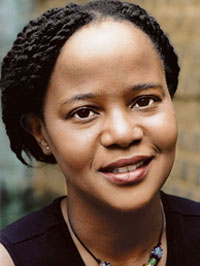 LITR 319-02: AUTHOR STUDIES: Edwidge Dantica
LITR 319-02: AUTHOR STUDIES: Edwidge Dantica
Time: 6:00 pm – 9:15 pm/Days: T
Professor: Monika Giacoppe (mgiacopp@ramapo.edu)
The contemporary fictions of Edwidge Danticat are grounded in the same historical and political realities that sustain her non-fiction work: the complicated world of Haiti, and the complex lives of Haitians and Haitian-Americans. Haiti, the world’s only nation to result from a successful slave uprising, has occupied a special place of reciprocal influence with the United States since its birth in 1804. In this course, we will learn about Haiti’s rich culture and history, and about the nation’s difficult relationship with the US, while studying novels, short stories, and non-fiction by Danticat. Readings will include Danticat’s Breath, Eyes, Memory; Krik? Krak!; The Dew Breaker; Brother, I’m Dying, and other works, as well as the novel trilogy, Love, Anger, Madness, by an earlier Haitian writer, Marie Vieux-Chauvet. Since winning a 2009 MacArthur Foundation grant, Danticat has been working to promote the writing of Haitian and Haitian-American authors in the US.
This course fulfills either the Author Studies requirement OR the International Literature requirement. It also counts as one of the three 300-level courses English & Literary Studies Majors must take. At the same time, it can fulfill the International/Multicultural Literature requirement for secondary Teacher Education Content Area Requirements (Literature).
LITR 414-01: The Performance of Everyday Life
Time: 3:45-5:15/Days: MR
Professor: Todd Barnes (toddbarnes@ramapo.edu)
Prior to the twentieth century, most people assumed that “great art” was defined by its ability to transcend the concerns and constraints of popular, everyday life. However, the twentieth century welcomed a number of artists, philosophers and activists who challenged the sacred line separating “art” from “real life.” These vanguard artists and scholars challenged traditional definitions of art by asking: What happens if we apply what we know about literary interpretation to the world outside of the book? If all the world is truly a stage, can we analyze that stage the way we analyze dramatic performances? What props and what settings shape the variety of characters we perform in our daily routines? How are theatrical rituals related to other social rituals, and how are these related to quotidian habits (e.g. ordering food, making jokes, puttering, or walking through the city)? How is the line separating art from everyday life constructed and maintained by institutions such as schools, churches, museums, galleries, and courts? This course will introduce students to an interdisciplinary field known as “everyday life studies,” a growing field that combines the methods and insights of literary studies with those of theatre and performance studies, anthropology, psychoanalysis, political theory, cartography, architecture, the visual arts, and sociology. The main text in the class will be the everyday life and world of the students, but we will also read essays by writers who have blurred the distinction between the “aesthetic” and the “everyday.” Such writers may include Walter Benjamin, Bertol Brecht, Michel de Certeau, Siegfried Kracauer, Sigmund Freud, Roland Barthes, Erving Goffman, Richard Scheckner, Guy Debord, J.L. Austin, Jacques Derrida and Slavoj Žižek.
This course can fulfill the capstone OR drama requirement for the English & Literary Studies Major. At the same time, it can fulfill the drama requirement for secondary education English certification.
 LITR 414-02: POSTMODERNISM
LITR 414-02: POSTMODERNISM
Time: 6:00 pm – 9:15 pm /Days: M
Professor: Vassiliki Flenga (vflenga@ramapo.edu)
Description: In the preface to Postmodern Literary Theory, Niall Lucy states: “Literature today is a very different concept from that of only a generation ago, and this difference is usually attributed to ‘postmodernism’ as a powerful signifier of the radically new and challenging.” This seminar will trace the notion of the postmodern in theory and fiction after World War II. After a brief historical overview of the development of the concepts of postmodernism and postmodernity, we will focus on texts by literary theorists such as Lyotard, Deleuze and Guattari, and Cixous that celebrate difference and experimental fiction by Blanchot, Barth, Calvino and Lispector that defy literary conventions and question our assumption of reality. Through the in-depth examination of a variety of literary, critical and visual texts, the course will enable students to analyze contemporary art forms and discuss their social, economic and political implications.
This course can fulfill either the Capstone OR International Literature requirement of the English & Literary Studies Major. At the same time, it can fulfill one of the International requirements for secondary education English certification.
SPRING 2013: LITR 319 MAJOR AUTHORS & LITR 414 LITERATURE SEMINAR & NEW COURSES
Spring 2013: Major Authors, Literature Seminar, and New Courses
Major Authors
MAJOR AUTHORS: WOOLF/MORRISON – 21310 – LITR 319 – 0
9:45 am – 11:15 am MR Lisa Williams
In very different cultural contexts, Toni Morrison and Virginia Woolf tell and retell personal and collective stories in such a way that asks readers to explore their own lives in terms of larger stories of compassion and survival. In the telling of stories, Morrison and Woolf rely on memory as central to understanding one’s identity and place in history. In this course, we will closely read their texts and analyze both the differences and similarities that bind together and separate these two great twentieth century writers. We will look at the historical and intellectual currents that have influenced these writers’ works. At the same time, we will examine their narrative strategies, their use of language, and their thematic concerns.
 MAJOR AUTHORS:JAMES JOYCE – 21311 – LITR 319 – 02
MAJOR AUTHORS:JAMES JOYCE – 21311 – LITR 319 – 02
11:30 am – 1:00 pm TF Instructor: Donald Fucci
James Joyce has been recognized as one of the most important writers of the twentieth century. The course will critically most of his works, including Portrait of the Artist as a Young Man. Ulysses, and Finnegans Wake.A Significant portion of the semester will be devoted to Ulysses and to various critical perspectives upon it. The class will also consider Joyce’s contributions to and influence on Irish history and culture and modern literature.
Literature Seminar
 SEMINAR: LITERATURE OF THE RENEGADE – 21316 – LITR 414 – 01
SEMINAR: LITERATURE OF THE RENEGADE – 21316 – LITR 414 – 01
9:45 am – 11:15 am TF Instructor: Peter Scheckner
This Seminar will explore a theme that has recurred throughout the literature of Europe, North America, and South America since the beginnings of Western literature with Homer’s Iliad (composed as an epic poem in the eighth century BCE). This is the theme of the man and woman in rebellion, the character that stands up, like the first rebel in Western literature Thersites in the Iliad in Book Two, and refuses to accept the status quo. The most articulate renegades, comics, madmen, or miscreants in literature are synonymous with some of the most enduring works in the Western world and in the Americas. Although we (or even the authors themselves) may laugh at these renegades, or try to distance ourselves from what they are saying, our laughter may also enlighten us; it can even transform who we once thought we were. In any event, these rebels make for great and enduring literature.
 SEMINAR: AMERICAN NOVEL & ENVIRONMENT – 21317 – LITR 414 – 02
SEMINAR: AMERICAN NOVEL & ENVIRONMENT – 21317 – LITR 414 – 02
3:45 pm – 5:15 pm TF Instructor: Edward Shannon
This course will consider the way the environment has been imagined, engaged, and explored within the American novel. While much of what we read will focus on “the natural world,” we will want to consider “the environment” in broader terms. For instance, we will read at least one novel set in New York City. We will try to approach these texts from a variety of perspectives. Some of these approaches may seem contradictory, but we will try to adapt ideas from from Buddhist and Taoist philosophies as well as contemporary literary theories, like Marxism and Cultural studies. These perspectives will ask us to consider both interior and exterior “environments.” Readings will focus on 20th and 21st century novels, but will include other readings—like Throeau’s Walden and Ralph Waldo Emerson’s “Nature”—as well. The reading list for Spring 2013 is in flux (Shannon invites suggestions). They will likely include Jack London’s The Call of the Wild, Cormac McCarthy’s The Road and other diverse novels.
New Courses
 THE GRAPHIC NARRATIVE – 21309 – LITR 279 – 01
THE GRAPHIC NARRATIVE – 21309 – LITR 279 – 01
6:00 pm – 9:15 pm Tues Instructor: Edward Shannon
The Graphic Narrative studies the rise and development of what some consider a “new” literary form: the graphic novel (or graphic narrative, or sequential art, or comic book). Of course, this “new” art form is at least a century old. In this course, we will consider the graphic narratives primarily as literary texts. Of course, graphic narratives are also works of visual art. Comics are filled with pictures, but these are not illustrations in the traditional sense–they are part of the language of the form. Students will need to negotiate two symbol systems–cartooning and language–and determine how they work together to create meaning. While many think of the graphic novel as an American form, it has become an international phenomenon. We will read comics from around the globe and consider them in cultural, historical, and literary contexts. To help us with this analysis, students will be asked to apply various theoretical concepts to the comics, including Cultural and Marxist Criticism. We will also read works in theory and criticism, as well as traditional literary texts. The reading list for Spring 2013 is in flux (Shannon again invites suggestions). They will likely include Moore’s Watchmen, Persepolis, and and other diverse graphic novels.
 THE MEDIEVAL AND MODERN IN TOLKIEN’S MIDDLE-EARTH – 21314 – LITR 354 – 01
THE MEDIEVAL AND MODERN IN TOLKIEN’S MIDDLE-EARTH – 21314 – LITR 354 – 01
2:00 pm – 3:30 pm MR Instructor: Yvette Kisor
In medieval England the Anglo-Saxons referred to the world as “middengeard”, or Middle-earth, a term better understood today as referencing J.R.R. Tolkien’s creation. The equivalence is not a coincidence, as Tolkien drew on Old English conceptions while infusing them with his own 20th century sensibility in creating his fictionalized world. This hybridized sense of Middle-earth as an intersection of the medieval and the modern is the subject of this course. Tolkien was a professor of Anglo-Saxon and well-versed in medieval literature–one could say immersed in it, and his creation of Middle-earth is a direct response to both his love for and intimate knowledge of medieval literature, and a response to what he saw as lacking in both the Old English corpus and the modern world. This course proposes to explore his created world of Middle-earth, primarily his novels THE LORD OF THE RINGS and THE SILMARILLION through the lens of intertextuality. Drawing in particular on Julia Kristeva’s notion of the intertext (and through her, Mikhail Bakhtin’s concept of dialogue), we will examine the Old English poetry that is in dialogue with Tolkien’s modern works, primarily BEOWULF as well as poems such as THE WANDERER and THE BATTLE OF MALDON, along with Old Norse works such as VOLSUNGSSAGA, and early Middle English texts like SIR GAWAIN AND THE GREEN KNIGHT and PEARL. Tolkien was a medievalist said to describe his task in creating the world of Middle-earth as “creating a mythology for English” and we will explore that world through the medieval works that infuse it.
 SHAKESPEARE ON FILM – 21306 – LITR 246 – 01
SHAKESPEARE ON FILM – 21306 – LITR 246 – 01
6:00 pm – 9:15 pm M Instructor: Todd L. Barnes (P)
The use of Shakespeare’s plays as celluloid “script” dates from the earliest stages of cinema history. One could propose that the cinema has been a major force in the way the 20th century has “Reinvented Shakespeare.” This course proposes to review the history of the treatment and adaptation of selected Shakespeare plays on film. We will read a select body of plays which have received multiple treatments, either in film and/or video formats, during different cultural epochs. Though the emphasis will be on Anglo-American directors, efforts by international film directors will also be considered.
FALL 2012: LITR 319 MAJOR AUTHORS & LITR 414 LITERATURE SEMINAR & NEW COURSES
Fall 2012: Major Authors, Literature Seminar, and New Courses
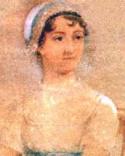 MAJOR AUTHORS: JANE AUSTEN – 41758 – LITR 319 – 01
Jane Austen’s (1775-1817) reputation as a novelist of manners in the British tradition is robust and continues to grow in the 21st century. Austen created a richly detailed fictional world in which she invested with importance the largely female concerns of family life, courtship and marriage. Her characters do venture to the city but it was the often brutal social and economic milieu of the English countryside which especially interested Austen. We will read five of her major novels–Sense and Sensibility, Pride and Prejudice, Mansfield Park, Emma and Persuasion. Her life and the issues related to gender and publication that it raises will be examined, and her life and works will be placed within the context of British history and the British literary canon. We will also place Austen in the framework of a specific British female literary tradition and read some of the scholars who have created Austen’s place in that tradition. The course will further examine issues of film adaptation of her literary works.
Class 11:30 am – 1:00 pm MR Instructor: Patricia M. Ard
MAJOR AUTHORS: JANE AUSTEN – 41758 – LITR 319 – 01
Jane Austen’s (1775-1817) reputation as a novelist of manners in the British tradition is robust and continues to grow in the 21st century. Austen created a richly detailed fictional world in which she invested with importance the largely female concerns of family life, courtship and marriage. Her characters do venture to the city but it was the often brutal social and economic milieu of the English countryside which especially interested Austen. We will read five of her major novels–Sense and Sensibility, Pride and Prejudice, Mansfield Park, Emma and Persuasion. Her life and the issues related to gender and publication that it raises will be examined, and her life and works will be placed within the context of British history and the British literary canon. We will also place Austen in the framework of a specific British female literary tradition and read some of the scholars who have created Austen’s place in that tradition. The course will further examine issues of film adaptation of her literary works.
Class 11:30 am – 1:00 pm MR Instructor: Patricia M. Ard
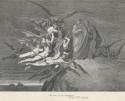 MAJOR AUTHORS: DANTE – 41747 – LITR 319 – 02
This course aims at introducing students to late medieval culture, using Dante, its foremost literary artist, as a focus. Attention is directed at medieval poetics, historiography, art and music in addition to political theory, religious, and social development of the time. The course emphasizes the continuity of Western tradition, especially the classical background of medieval culture, and its transmission to the modern world. Students study the Divine Comedy both as a mirror of high medieval culture and as a unique text that breaks out of its cultural bounds. Students will be engaged in close reading and discussion of Dante’s Vita Nuova and the Divine Comedy and will search for answers as to why after seven centuries the Commedia remains central to the European literary tradition.
6:00 pm – 9:15 pm M Instructor: Rosetta Dangelo
MAJOR AUTHORS: DANTE – 41747 – LITR 319 – 02
This course aims at introducing students to late medieval culture, using Dante, its foremost literary artist, as a focus. Attention is directed at medieval poetics, historiography, art and music in addition to political theory, religious, and social development of the time. The course emphasizes the continuity of Western tradition, especially the classical background of medieval culture, and its transmission to the modern world. Students study the Divine Comedy both as a mirror of high medieval culture and as a unique text that breaks out of its cultural bounds. Students will be engaged in close reading and discussion of Dante’s Vita Nuova and the Divine Comedy and will search for answers as to why after seven centuries the Commedia remains central to the European literary tradition.
6:00 pm – 9:15 pm M Instructor: Rosetta Dangelo
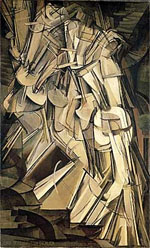 SEMINAR: INTERNATIONAL MODERNISM – 41763 – LITR 414 – 01
This course will look at modernism—the artistic period taking place between the two world wars—from an international perspective. We will look closely at both the form and content of literary texts as we analyze how different writers contributed to this movement. The effects of World War I, as well as the discoveries of Freud and Einstein, radically changed how people responded to the world around them. We will examine how artists, particularly writers, reacted to the great upheavals of the early twentieth century.
9:45 am – 11:15 am MR Instructor: Lisa Williams
SEMINAR: INTERNATIONAL MODERNISM – 41763 – LITR 414 – 01
This course will look at modernism—the artistic period taking place between the two world wars—from an international perspective. We will look closely at both the form and content of literary texts as we analyze how different writers contributed to this movement. The effects of World War I, as well as the discoveries of Freud and Einstein, radically changed how people responded to the world around them. We will examine how artists, particularly writers, reacted to the great upheavals of the early twentieth century.
9:45 am – 11:15 am MR Instructor: Lisa Williams
SEMINAR: ARTHURIAN LITERATURE – 41764 – LITR 414 – 02
This seminar course is the capstone of the English & Literary Studies Major. During the semester we will be looking at Arthurian literature. The first half of the course will focus on the origins of the Arthurian legend and its medieval developments; in the second half we will consider retellings of the legend in later centuries. Through a series of linked assignments culminating in a research paper, students will explore how the legend changes as it is taken up by different authors and cultures.
3:00 pm – 6:15 pm W Instructor: Yvette L. Kisor
In Fall 2012, Literature is offering the following courses for the first time in years :
 LITR 304 – 01 HISTORY OF THE ENGLISH LANGUAGE
LITR 304 – 01 HISTORY OF THE ENGLISH LANGUAGE
This course traces the development of the English language from its Indo-European roots through the major stages of English, including Old English (the language of Beowulf), Middle English (Chaucer’s English), and early modern English (Shakespeare’s English), through present day English. We will begin by establishing grammatical and linguistic categories and examining some principles of historical linguistics, focusing on the mechanisms and causes of language change. Our study will include etymology (particularly work with the OED) and developments in American English, including dialectical variety. The course seeks to make students aware of the structure of their language and help them become sensitive to linguistic change and difference.
This course fulfills the “Theory and Process of Language” category of the major as well as the “Structure and Criticism” requirement for the “Teacher Education Content Area Requirements (English)” Teacher Education Requirement.Day/Time: 11:30 am – 1:00 pm Days: MR
Instructor: Yvette Kisor (ykisor@ramapo.edu)
 LITR 376 – 01 BRAZILIAN LITERATURE & CULTURE
LITR 376 – 01 BRAZILIAN LITERATURE & CULTURE
(course offered in English)
This course will provide students with an introduction to Brazilian literary production within the context of major historical periods. They will also explore the diverse social and political movements and cultural practices that coincide with them. Ideally, students will identify, despite the diversity and transnational character of many of its people, the search for and development of a distinctly Brazilian national identity. Selected major literary works in translation will be studied alongside other Brazilian cultural products, such as film, music, visual and plastic arts, architecture, historical documents and non-fiction writing in order to gain a critical understanding of this Latin American “invisible giant” and its people. A central objective here is to interpret cultural products and practices with a critical awareness of identity, economy and power. This advanced course fulfills the international focus requirement for the English & Literary Studies Major. As the only course that focuses entirely on Brazil, it is an excellent option for the Latin American Studies Minor.
BRAZILIAN LITERATURE & CULTURE fulfills the “International Literature” category of the major as well as the “International/Multicultural Literature” requirement for the “Teacher Education Content Area Requirements (English)” for Teacher Education.
General Education: This course fulfills the International Issues category because it allows us to analyze and interpret a variety of contemporary issues in Brazil and its interconnectedness to other nations.
Prerequisite: Any 200-level Literature course
Day/Time: 2:00 am – 3:30 pm Days: TF Instructor: Paula Straile-Costa (pstraile@ramapo.edu)
In Fall 2012, Literature offers other unique courses:
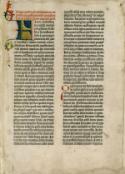 LITR 265 – 01 THE HEBREW BIBLE
LITR 265 – 01 THE HEBREW BIBLE
(course offered in English)
An explanation of Biblical literature, its metaphors and literary forms, its theological constructions, and religious insights. The meaning of the Bible as a literary and religious document will be examined through a series of readings and discussions.
It is no exaggeration to affirm that the most influential book in human history is the Bible. This book has shaped the culture, music, art, architecture, legal and ethical systems, literature, philosophy, politics and history of a substantial part of the human family. It is the reference Judaism, Christianity and Islam cite for the structure of their religious systems. The sweep is breath-taking. A thorough analysis of the cultures in which we live is not likely if we are ignorant of this book.
The course in the Old Testament (the Hebrew Bible) is a literature course. It prescinds from where students are religiously and from whether or not they affirm the existence of God. Its intent is an understanding of the literary dynamics of the Bible. We shall explore some of the most compelling stories ever told: the origins of the cosmos, human fallibility, the flood, the narratives of conflicted men and women, the commandments, the extraordinary love poetry of the Song of Songs, the trauma of Job in the agony of his effort and failure to understand human suffering.
The literature of the Old Testament (the Hebrew Bible) is a human story of heart-breaking loss and ecstatic happiness, a story, like all great literature, that is radically different from us and yet somehow thoroughly ours. Its intent is to help us understand not only humanity but our own lives.
Class 8:00 am – 11:15 am W– Instructor: Anthony Padovano
This course fulfills the “International” OR “Pre-1800” category of the major as well as the “International” requirement for the “Teacher Education Content Area Requirements (English)” Teacher Education Requirement. It also fulfills requirements in General Education. See the catalog for more.
SUMMER 2012
As of May 9, 2012, Dean Hassan Nejad has canceled most of the LITR summer courses.
SURVEY OF AMERICAN POETRY – 30201 – LITR 223 – 50 (Online Course, Lisa Williams, liwillia@ramapo.edu instructor) is still open.
SPRING 2012: LITR 319 MAJOR AUTHORS & LITR 414 LITERATURE SEMINAR & NEW COURSES
 MAJOR AUTHOR: CHAUCER
MAJOR AUTHOR: CHAUCER
Time: 11:30 am – 1:00 pm Days: MR
Instructor: Yvette Kisor (ykisor@ramapo.edu)
Description: This course focuses on some of the works of Geoffrey Chaucer. The majority of the course (9 weeks) will be spent examining The Canterbury Tales. We will study a generous selection of the tales in some detail, as well as examine the work as a whole. In addition, several weeks will be spent focusing on Troilus and Criseyde and The Legend of Good Women, as well as some of the shorter poems. We will read Chaucer in the original Middle English, and will focus on the language as part of our study, as well as consider relevant social and political contexts of Chaucer’s day, and examine some of the critical and interpretive issues that have especially concerned scholars This course focuses on some of the works of Geoffrey Chaucer. The majority of the course (9 weeks) will be spent examining The Canterbury Tales. We will study a generous selection of the tales in some detail, as well as examine the work as a whole. In addition, several weeks will be spent focusing on Troilus and Criseyde and The Legend of Good Women, as well as some of the shorter poems. We will read Chaucer in the original Middle English, and will focus on the language as part of our study, as well as consider relevant social and political contexts of Chaucer’s day, and examine some of the critical and interpretive issues that have especially concerned scholars
This course fulfills either the Major Author requirement OR the pre-1800 Literature requirement. It also counts as one of the three 300-level courses English & Literary Studies Majors must take. At the same time, it can fulfill the British Literature requirement for secondary Teacher Education Content Area Requirements (Literature).
 LITR 319 – 04 MAJOR AUTHORS:James Joyce
LITR 319 – 04 MAJOR AUTHORS:James Joyce
Time: 6:00 pm – 9:15 pm pm Days: T
Instructor: Don Fucci (dfucci@ramapo.edu)
Description: James Joyce has been recognized as one of the most important writers of the twentieth century. The course will critically most of his works, including Portrait of the Artist as a Young Man. Ulysses, and Finnegans Wake.A Significant portion of the semester will be devoted to Ulysses and to various critical perspectives upon it. The class will also consider Joyce’s contributions to and influence on Irish history and culture and modern literature.
as ruin.
This course fulfills the Major Author requirement of the English & Literary Studies Major. It also counts as one of the three 300-level courses English & Literary Studies Majors must take. OR it may fulfill the International Literature requirement for the Major. At the same time, it can fulfill the International/Multicultural Literature requirement for secondary Teacher Education Content Area Requirements (Literature).
LITR 414: LITERATURE SEMINAR
LITR 414 – LITERATURE SEMINAR: POSTMODERNISM
Time: 6.00-9.15 M Days: M
Instructor: Vassiliki Flenga (vflenga@ramapo.edu)
Description: In the preface to Postmodern Literary Theory, Niall Lucy states: “Literature today is a very different concept from that of only a generation ago, and this difference is usually attributed to ‘postmodernism’ as a powerful signifier of the radically new and challenging.” This seminar will trace the notion of the postmodern in theory and fiction after World War II. After a brief historical overview of the development of the concepts of postmodernism and postmodernity, we will focus on texts by literary theorists such as Lyotard, Deleuze and Guattari, and Cixous that celebrate difference and experimental fiction by Blanchot, Barth, Calvino and Lispector that defy literary conventions and question our assumption of reality. Through the in-depth examination of a variety of literary, critical and visual texts, the course will enable students to analyze contemporary art forms and discuss their social, economic and political implications.
This course can fulfill either the Capstone OR International Literature requirement of the English & Literary Studies Major. At the same time, it can fulfill one of the International requirements for secondary education English certification.
LITR 414: LITERATURE SEMINAR
LITR 414 – LITERATURE SEMINAR: The Performance of Everyday Life
Time: 11.30 am- 1.00 MR Days: MR
Instructor: Todd Barnes (toddbarnes@ramapo.edu)
Description: Prior to the twentieth century, most people assumed that “great art” was defined by its ability to transcend the concerns and constraints of popular, everyday life. However, the twentieth century welcomed a number of artists, philosophers and activists who challenged the sacred line separating “art” from “real life.” These vanguard artists and scholars challenged traditional definitions of art by asking: What happens if we apply what we know about literary interpretation to the world outside of the book? If all the world is truly a stage, can we analyze that stage the way we analyze dramatic performances? What props and what settings shape the variety of characters we perform in our daily routines? How are theatrical rituals related to other social rituals, and how are these related to quotidian habits (e.g. ordering food, making jokes, puttering, or walking through the city)? How is the line separating art from everyday life constructed and maintained by institutions such as schools, churches, museums, galleries, and courts? This course will introduce students to an interdisciplinary field known as “everyday life studies,” a growing field that combines the methods and insights of literary studies with those of theatre and performance studies, anthropology, psychoanalysis, political theory, cartography, architecture, the visual arts, and sociology. The main text in the class will be the everyday life and world of the students, but we will also read essays by writers who have blurred the distinction between the “aesthetic” and the “everyday.” Such writers may include Walter Benjamin, Bertol Brecht, Michel de Certeau, Siegfried Kracauer, Sigmund Freud, Roland Barthes, Erving Goffman, Richard Scheckner, Guy Debord, J.L. Austin, Jacques Derrida and Slavoj Žižek.
This course can fulfill the capstone OR drama requirement for the major. At the same time, it can fulfill the drama requirement for secondary education English certification.
FALL 2011: LITR 319 MAJOR AUTHORS & LITR 414 LITERATURE SEMINAR & NEW COURSES
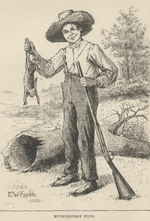 LITR 319 MAJOR AUTHORS: Mark Twain
LITR 319 MAJOR AUTHORS: Mark Twain
Time: 2-3.30 Days: TF
Instructor: Edward Shannon (eshannon@ramapo.edu)
Description: In this class we will examine the work of one author in detail. Our goal is to understand the work of this author in a variety of contexts. While we want to be able to appreciate the works for their individual merits, we also want to approach the work in historical and biographical contexts. Through intensive study of one author, we hope to gain insight into his artistic project, and to become “experts” on a major literary figure.
The writer whose work we will examine is virtually synonymous with American for much of the world. Mark Twain was one of first American literary celebrities nationwide and abroad. A southerner who went west, and later settled in Connecticut, Twain could represent the nation in a way that few other writers could. He was also perceived abroad as, in Twain’s words “Not an American,” but “the American.” Through a reading of Twain’s fiction and non-fiction, we will grapple with a writer whose savage wit and literary daring still shocks and delights readers almost a century after his death.
This course fulfills either the Major Author requirement, or the American Literature requirement of the English and Literary Studies Major. It also counts as one of the three 300-level courses English and Literary Studies Majors must take. At the same time, it can fulfill the American Literature requirement for secondary Teacher Education Content Area Requirements (Literature).
 LITR 319 – MAJOR AUTHORS:SAMUEL BECKETT/JEAN GENET
LITR 319 – MAJOR AUTHORS:SAMUEL BECKETT/JEAN GENETTime: 6-9:15 pm Days: M
Instructor: Val Flenga (vflenga@ramapo.edu)
Description: Samuel Beckett and Jean Genet are two internationally renowned literary figures of the 20th century. Samuel Beckett, an Irishman who became a leading French writer, has produced novels and plays written in French and in English and translated often by the author himself; Beckett’s plays are still widely performed in Europe and the United States. Jean Genet, a notorious poet-thief, took the French literary establishment by surprise with the unsettling newness of his prose; he inspired two major continental philosophers, Sartre and Derrida to devote book-length studies to his work. Genet became famous in the United States with his play, The Blacks and his political activism alongside the poets Burroughs and Ginsberg and militant groups such as the Black Panthers. During the semester, we will concentrate on the dramatic works of both authors whose avant-garde dramaturgy inaugurated a new theater that staged unforgettable pungent images of humanity and human experiences. Beckett’s foreign, post-apocalyptic, minimal stage contrasts with Genet’s splendid and dazzling images and language. We will also consider significant performances of Beckett’s and Genet’s plays and criticism either produced by or devoted to the two authors. Finally, we will explore representations of the political in Beckett’s and Genet’s theater, that is to say, the dramatists’ elaboration of the concept of the city which appears often as ruin.
This course fulfills the Major Author requirement of the English and Literary Studies Major. It also counts as one of the three 300-level courses English and Literary Studies Majors must take. OR it may fulfill the International Literature requirement for the Major. At the same time, it can fulfill the International/Multicultural Literature requirement for secondary Teacher Education Content Area Requirements (Literature).
LITR 414: LITERATURE SEMINAR
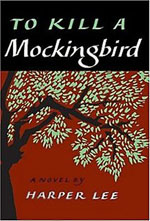 LITR 414 – LITERATURE SEMINAR: LITERATURE AND LAW
LITR 414 – LITERATURE SEMINAR: LITERATURE AND LAW
Time: 8.00-9.30 pm Days: MR
Instructor: Patricia Ard (pard@ramapo.edu)
Description: This is an interdisciplinary, literature-based course examining fictional and non-fictional literature on American law. There is an emerging field of literature and law which recognizes how essentially stories shape the field of law, how an understanding of the ambiguity inherent in studying literature can assist anyone examining the law, and how such literary acts as character analysis and inference span the two disciplines. Much of American philosophy and culture are embedded in its literature, and the literature of the law is a particularly rich site for exploring the meaning of American life and its legal culture.
This course can fulfill either the Capstone or American Literature requirement of the English & Literary Studies Major. At the same time, it can fulfill one of the American requirements for secondary Teacher Education Content Area Requirements (Literature).
This course can fulfill either the Capstone or International Literature requirement of the English & Literary Studies Major. At the same time, it can fulfill one of the International requirements for secondary education English certification.
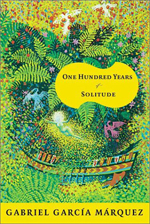 LITR 414 LITERATURE SEMINAR: FICTIONAL HISTORIES OF THE AMERICAS
LITR 414 LITERATURE SEMINAR: FICTIONAL HISTORIES OF THE AMERICAS
Time: 6-9.15 pm Days: T
Instructor:Monika Giacoppe (mgiacopp@ramapo.edu)
Description: Important cultural differences separate the many American nations, but much common history also unites the Americas North and South, and the islands of the Caribbean. In this course, we will examine the representation of history in fictional texts from the Americas. We will explore the common historical issues that unite the countries of the Americas, while also noting the distinctive historical patterns and moments that have contributed to each nation’s unique path of development. This aspect of the course will help us to better understand the histories and cultures of the region, and the ways in which they are interconnected. Furthermore, we will examine the relationship between history and fiction, by asking questions such as the following: What do fiction and history have in common, and by what characteristics are they separated? What can fiction teach us about history?
This course can fulfill either the Capstone OR International Literature requirement of the English and Literary Studies Major. At the same time, it can fulfill either the American or International Literature requirements for secondary education English certification. secondary Teacher Education Content Area Requirements (Literature).
SPRING 2011: LITR 319 MAJOR AUTHORS & LITR 414 LITERATURE SEMINAR & NEW COURSES
LITR 319: MAJOR AUTHORS
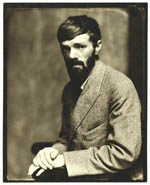 LITR 319 MAJOR AUTHORS: D. H. Lawrence
LITR 319 MAJOR AUTHORS: D. H. Lawrence
Time: TBA Days: TF
Instructor: Peter Scheckner (pscheckn@ramapo.edu)
Description: D. H. Lawrence is one of the major figures in twentieth century British fiction whose social background is working class. His writings are painfully reflective of social class and the rise of modern, industrial capitalism at the beginning of this century. However, Lawrence is also unique in his visionary outlook on almost every aspect of twentieth century Western society in addition to social class: sexuality, the relationship between men and women, the individual’s relationship to society, the function of culture, and the value of religion and spirituality in the world as he saw it. In his huge canon of novels, essays, short stories, plays, poetry, paintings, and over five thousand letters he explored these areas and presented his singular “Lawrentian” vision.
Lawrence is the great iconoclast of this century, attacking most of the social, sexual, religious, and gender norms we take for granted. His grand artistic struggle against the values he detested and for those in which he believed was original, provocative, and profane. It is hard to think of a literary figure of our age more original in his or her artistic expression and themes. This course will examine perhaps his three greatest novels, some of his short stories, and three novellas, time permitting of course. The central concern of this class will be to articulate Lawrence’s unique and prophetic vision of the early decades of the twentieth century.
This course fulfills either the Major Author requirement, or the British Literature requirement of the English and Literary Studies Major. It also counts as one of the three 300-level courses English and Literary Studies Majors must take. At the same time, it can fulfill the International Literature requirement for secondary education English certification.
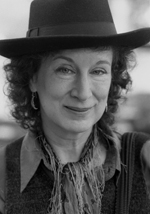 LITR 319 – MAJOR AUTHORS: MARGARET ATWOOD
LITR 319 – MAJOR AUTHORS: MARGARET ATWOODTime: TBA pm Days: TF
Instructor: Monika Giacoppe (mgiacopp@ramapo.edu)
Description: MARGARET ATWOOD: This course will provide an in-depth look at the writings of a contemporary author from Canada who has established a truly international reputation for herself. Although Atwood began her writing career as a poet, she is best known as a novelist and Canadian nationalist. In this course, we will examine the range of Atwood’s literary production, studying several of her novels, selections of her poetry, and one of her collections of short fiction. We will also explore Atwood’s contributions to the field of literary criticism. This course should help you to appreciate the depth and breadth of Atwood’s work, to recognize and understand some of the recurring themes and motifs that characterize her oeuvre, and to trace their development over the course of her career to date. We will also discuss how Atwood’s “Canadianness” is a shaping and defining feature of her literary production. Furthermore, this class will help you to develop your own skills in researching and analyzing literary texts.
We’ll read some of Atwood’s novels, including The Edible Woman, Surfacing, The Handmaid’s Tale, and Alias Grace. We’ll also read some of her essays, poetry, and Wilderness Tips, a book of short stories.
This course can fulfill either the Major Author or International Literature requirement of the English and Literary Studies Major. At the same time, it can fulfill the European/International requirement for secondary education English certification.
LITR 414: LITERATURE SEMINAR
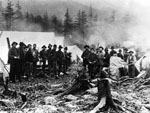 LITR 414 – LITERATURE SEMINAR: THE AMERICAN NOVEL AND THE ENVIRONMENT
LITR 414 – LITERATURE SEMINAR: THE AMERICAN NOVEL AND THE ENVIRONMENT
Time: TBA pm Days: TF
Instructor: Edward Shannon (eshannon@ramapo.edu)
Description: This course will consider the way the environment has been imagined, engaged, and explored within the American novel. While much of what we read will focus on “the natural world,” we will want to consider “the environment” in broader terms. For instance, we will read at least one novel set in New York City. We will try to approach these texts from a variety of perspectives. Some of these approaches may seem contradictory, but we will try to adapt ideas from from Buddhist and Taoist philosophies as well as contemporary literary theories, like Marxism and Cultural studies. These perspectives will ask us to consider both interior and exterior “environments.” Readings will focus on 20th and 21st century novels, but will include other short readings—like Ralph Waldo Emerson’s “Nature”—as well. Readings will include Jack London’s The Call of the Wild, Jean Toomer’s Cane, Colum McCann’s Let the Great World Spin, and other diverse novels.
 LITR 414 – LITERATURE SEMINAR:International Modernism
LITR 414 – LITERATURE SEMINAR:International ModernismTime: TBA pm Days: MR
Instructor: Lisa Williams (liwillia@ramapo.edu)
Description: This course will look at modernism—the artistic period taking place between the two world wars—from an international perspective. We will look closely at both the form and content of literary texts as we analyze how different writers contributed to this movement. The effects of World War I, as well as the discoveries of Freud and Einstein, radically changed how people responded to the world around them. We will examine how artists, particularly writers, reacted to the great upheavals of the early twentieth century.
Copyright ©2025 Ramapo College Of New Jersey. Statements And Policies. Contact Webmaster.
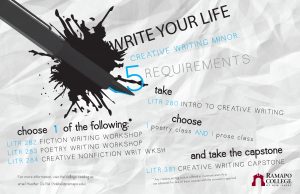
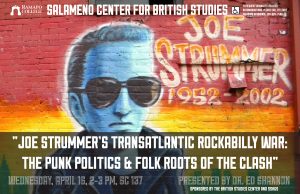
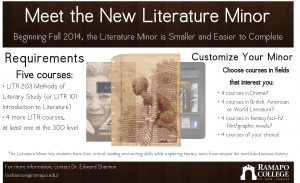
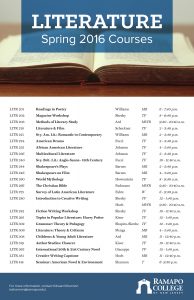
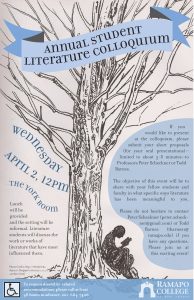
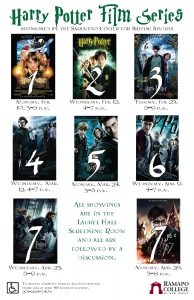
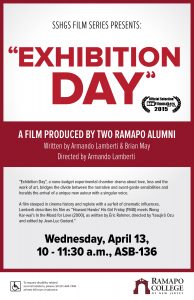
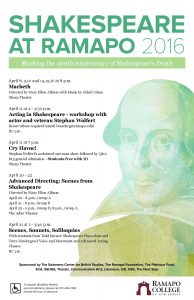
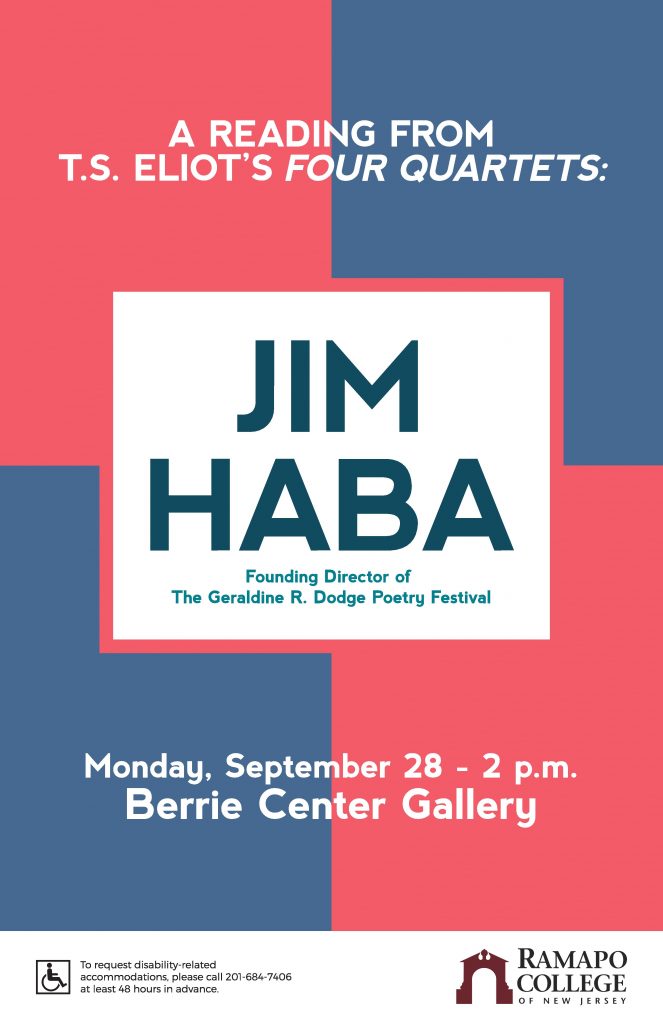
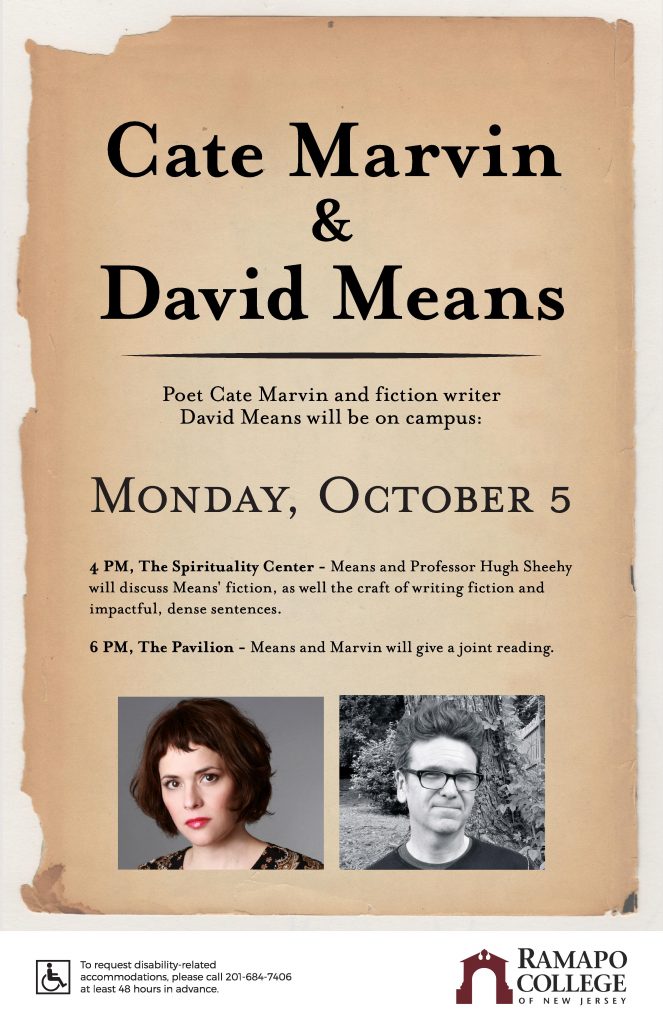
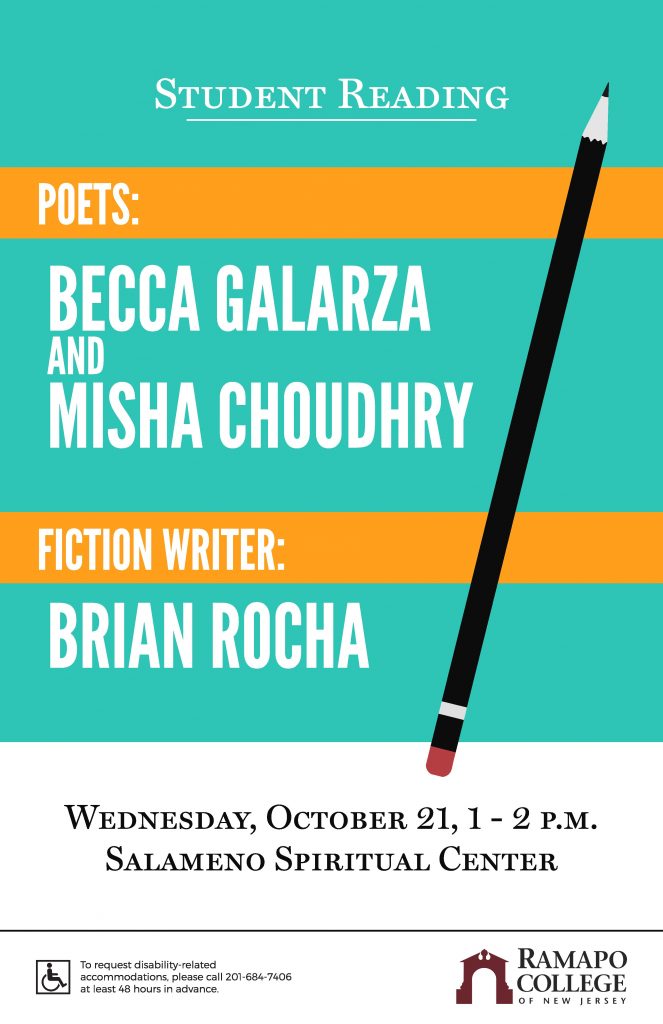










Follow Ramapo